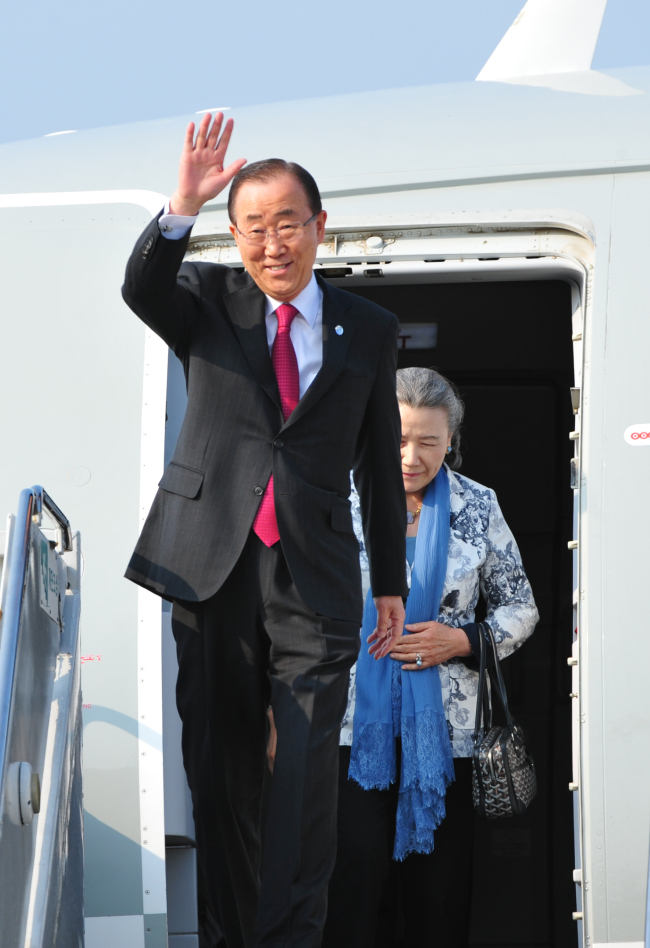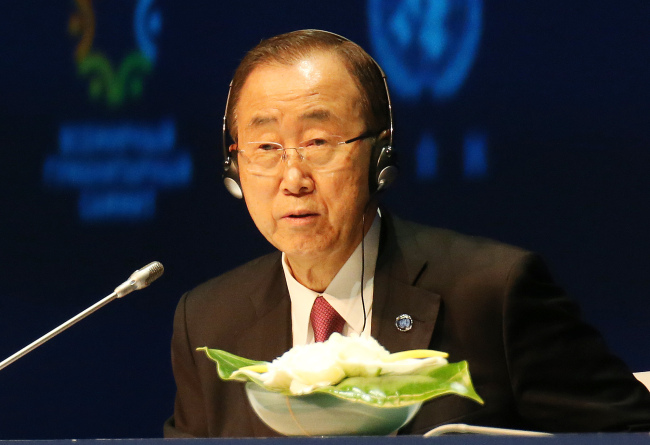U.N. Secretary-General Ban Ki-moon began a six-day visit in South Korea on Wednesday with a series of meetings with government officials and senior politicians, amid widening speculation that he might run in next year’s presidential election.
Ban arrived at Jejudo Island to attend the Jeju Forum alongside foreign head of state and local politicians. He is scheduled to meet with Prime Minister Hwang Kyo-ahn on Thursday before leaving for the G7 Summit in Japan. Following the two-day event, he will return to see his family and attend events in his home state.
The trip, which came a year after his last visit in 2015, is likely to be highly politicized in light of the long-standing debate over his potential presidential bid: Whether he will run for the election and, if he runs, which party he will represent and how successful he will be.
 |
U. N. Secretary-General Ban Ki-moon arrives at Jeju International Airport on Wednesday for his six-day visit to South Korea. Joint Press Corps. |
“I would seek what I can do as a Korean when my term ends,” said Ban on Wednesday at a press conference in Jejudo Island. His term ends in December this year and the next presidential election is slated to take place in 2017.
The remark was seen as to be more welcoming gesture to the presidential bid than before. The 71-year-old diplomat had neither confirmed nor denied whether he will run, saying that he just want to finish his 10-year tenure “on a sound note”
Despite his repeated attempt to downplay the prospect, politicians and pundits here have dismissed his ambiguous stance as one of his signature diplomatic styles and expect him to run given his strong popularity in opinion polls.
A local pollster Realmeter survey showed on Friday that Ban was picked as the most favorable presidential candidate. He garnered 38 percent in approval ratings, outpacing other political heavyweights such as former presidential candidate Rep. Moon Jae-in and the People’s Party leader Rep. Ahn Cheol-soo.
“I think he has a strong desire for power,” said Rep. Ahn Hong-joon of the Saenuri Party on Wednesday. “Throughout his 10-year tenure, he has met with heads of states around the world and gained precious experience. We have to use his asset as leverage by electing him as a president,” he said.
One of Ban’s credentials as a strong presidential candidate comes from his political base. He hails from Gongju City in southern Chungcheong Province, a region seen as a bellwether electorate that has often dictated the election outcome over the past decade.
Since the 1992 presidential election, the candidates gathering the biggest number of votes in Chungcheong have been elected as the president. The region’s prominent politicians, such as former Prime Minister Kim Jong-pil, had urged him to play a “bigger role” in Korea’s politics.
Aware of Ban’s political assets, the Saenuri Party lawmakers have shown enthusiasm for putting Ban on their presidential ticket. The ruling party, which lost its parliamentary majority in the latest election, is struggling to find presumptive presidential candidates as prominent as the ones from the opposition bloc.
While the opposition presidential hopefuls range from Rep. Moon to the People Party’s leader Ahn Cheol-soo, the likely candidates from the Saenuri Party have either lost the latest general election or have taken a backseat due to factional strife.
But the Saenuri’s choice has to clear several hurdles before being elected as a party candidate, namely the internal primaries attached with intensive scrutiny. Former party leader Rep. Kim Moo-sung said that Ban should have “fair competition” with party candidates, dismissing the possibility of bypassing primaries.
Some Saenuri Party members cautioned that the career diplomat may not survive harsh scrutiny during the party nomination. Vice National Speaker Rep. Chung Gap-yoon of the Saenuri Party said, “Ban needs more experience in local politics to become the party’s candidate.”
 |
U.N. Secretary-General Ban Ki-moon AFP-Yonhap |
Ban’s relations with President Park Geun-hye is another dynamic that comes into play. Ban has enjoyed political limelight for his frequent meetings with President Park Geun-hye and her factional member’s apparent support for him.
But pundits and media outlets have highlighted that the candidate endorsed by a former president has never been elected as a president. Since South Korea began to elect its own president through direct elections in 1987, the most successful agenda by a candidate was by rebuking the former presidents’ legacy.
Also among the challenges he may face is his work at the U.N. Over the past few days, liberal bigwigs have claimed that his run for the presidential election would clash with the U.N. resolution that encourages the world’s highest diplomat to stay away from local politics after the term ends.
“It is appropriate to follow the U.N. recommendation,” Seoul Mayor Park won-soon said in a media interview, referring to the provision that asks former U.N. chiefs to “refrain” from taking official positions in governments following tenure.
But diplomatic sources said that the provision is not compulsory. Among the seven former U.N. chiefs, three have served as government officials, including fourth U.N. chief Kurt Waldheim who served as the president of Austria.
Some pundits noted that his support for “global issues” such as protection of gay rights would undermine his popularity if he runs as a Saenuri Party candidate. The conservative party has been keeping away from the topic of homosexuals and other minorities, while some of its key members such as Rep. Kim Moo-sung have bluntly said that gays “destroy humanity.” The party has also opposed bills banning discrimination against homosexuality.
“One of Ban’s legacies as U.N Secretary-General is his effort to improve gay rights. I am curious how the conservative would react if Ban’s support for sexual minorities become a hot issue in the election” said Yoon Tae-gon, a senior political analyst at Moa Agenda Strategy, in an op-ed published in Weekly Donga.
By Yeo Jun-suk (
jasonyeo@heraldcorp.com)







![[Exclusive] Hyundai Mobis eyes closer ties with BYD](http://res.heraldm.com/phpwas/restmb_idxmake.php?idx=644&simg=/content/image/2024/11/25/20241125050044_0.jpg)
![[Herald Interview] 'Trump will use tariffs as first line of defense for American manufacturing'](http://res.heraldm.com/phpwas/restmb_idxmake.php?idx=644&simg=/content/image/2024/11/26/20241126050017_0.jpg)
![[Herald Review] 'Gangnam B-Side' combines social realism with masterful suspense, performance](http://res.heraldm.com/phpwas/restmb_idxmake.php?idx=644&simg=/content/image/2024/11/25/20241125050072_0.jpg)